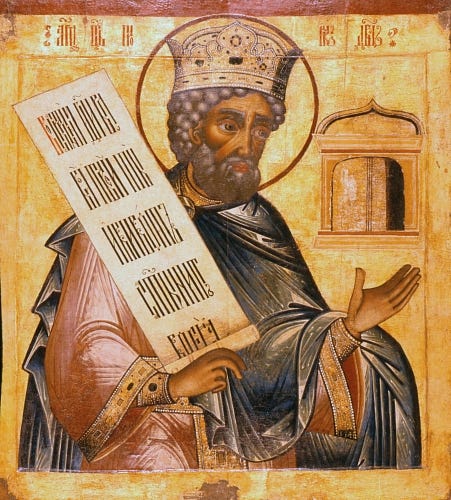The Yeshiva King
Was King David a prototype for IDF exemptions?
There are various alleged “prooftexts” commonly trotted out by those who claim to believe that the full-time Torah learning of charedi yeshivah students is so important that it justifies endless tens or hundreds of thousands of them not serving in the army. One of them is with regard to King David:
דאמר רבי אבא בר כהנא אילמלא דוד לא עשה יואב מלחמה ואילמלא יואב לא עסק דוד בתורה דכתיב (שמואל ב ח, טו) ויהי דוד עושה משפט וצדקה לכל עמו ויואב בן צרויה על הצבא מה טעם דוד עשה משפט וצדקה לכל עמו משום דיואב על הצבא ומה טעם יואב על הצבא משום דדוד עושה משפט וצדקה לכל עמו
Rabbi Abba b. Kahana said: If not for David, Yoav could not have waged war; and were it not for Yoav, David could not have engaged in Torah. As it is written: “And David administered justice and righteousness for all his people; and Yoav the son of Zeruyah was over the host” (Shmuel II, 8:15–16). Why did David administer justice and righteousness for all his people? Because Yoav was over the host. And why was Yoav over the host? Because David was administering justice and righteousness for all his people. (Talmud, Sanhedrin 49a)
Let us first note that the Gemara does not necessarily mean that Yoav was victorious due to David’s Torah. In fact, a close reading of the analogy between David and Yoav implies otherwise. It seems to mean that, in the same way that David had opportunity to engage in Torah because Yoav was handling military matters, Yoav had opportunity to handle military matters because David was handling the spiritual adminstration of the people.
Still, Rashi and others do understand it to mean that Yoav was victorious in the merit of David’s Torah. So does this demonstrate that tens and hundreds of thousands of charedim should learn full-time in yeshivah rather than serving in the army?
There are two responses to be made to such a claim. One is that King David was not exactly a charedi yeshiva student. As Rav Aharon Lichtenstein writes:
…this source is of little use to our critics on the right because of its protagonist. If they really wish to posit David, the heroic and sensitive soldier-scholar-poet-votary so graphically portrayed by Hazal in numerous contexts, as the prototype of the contemporary Israeli ben torah, I shall have little quarrel with them.
They key point here is that King David himself was very much a soldier. He simply took on a different role later in life.
(UPDATE: Ezra Brand pointed out that the Biblical verse in fact gives the exact point where this happened, 13 chapters later than that one quoted in Sanhedrin 49a (Shmuel II, 8:15–16). It was after David was almost killed by a giant Philistine in battle, and was saved by Avishai son of Zeruyah (Yoav's brother): "It was then that David’s men declared to him on oath, “You shall not go with us into battle any more, lest you extinguish the lamp of Israel!” (Samuel II 21:17). Meaning, he was explicitly prohibited by his men to go into combat anymore, since he was too important to risk. Since he was king ("Ner Yisrael"), and his loss would be devastating.)
The second response to be made is that the very proof-text that the Gemara itself cites does not describe King David as sitting in yeshiva and learning. Rather, it describes him as “executing justice and righteousness upon the people.” In other words, King David was not a yeshivah student, he was a chief rabbi and judge. (Note too that it doesn’t say that David was “learning” Torah - it says that he was osek b’Torah, engaged in matters of Torah.) The merit that he provided to Yoav was one of ensuring that society was just and righteous. It is not remotely referring to yeshiva students.
As I’ve said before, charedim are, in general, very reticent about being sure what exactly Chazal were talking about, and are correspondingly very cautious about extrapolating to current situations. Chazal say to make a beracha on a beautiful animal? Well, we don’t know exactly what they would define as “beautiful,” so we’ll never make the beracha. Chazal talk about the value of work and self-sufficiency? Well, that doesn’t necessarily apply nowadays. Chazal say X? Well, there’s one opinion which says that they didn’t mean it in the case of Y. And yet here, where Chazal are explicitly not remotely referring to yeshiva students, charedim claim that they are referring to precisely that.
This isn’t bringing a proof from Chazal - it’s forcing your beliefs into them.




Great piece, as usual.
Re "They key point here is that King David himself was very much a soldier. He simply took on a different role later in life."
The Biblical verse in fact gives the exact point where this happened, 13 chapters later than that one quoted in Sanhedrin 49a (Shmuel II, 8:15–16). It was after David was almost killed by a giant Philistine in battle, and was saved by Avishai son of Zeruyah (Yoav's brother):
https://www.sefaria.org.il/II_Samuel.21.17:
אז נשבעו אנשי־דוד לו לאמר לא־תצא עוד אתנו למלחמה ולא תכבה את־נר ישראל
"It was then that David’s men declared to him on oath, “You shall not go with us into battle any more, lest you extinguish the lamp of Israel!”"
(The Talmud in Sanhedrin 95a greatly expands on that short Biblical story, see my discussion here:
https://www.ezrabrand.com/p/one-day-david-went-falcon-hunting)
Meaning, he was explicitly prohibited by his men to go into combat anymore, since he was too important to risk. Since he was king ("Ner Yisrael"), and his loss would be devastating
How does Yeshivalnd understand the converse? What does the gemoroh mean 'Were it not for Yoav, Dovid could not be involved in tzedoko u'mishpot' (lose translation)? Why not? Torah protects, no? Shouldn't need Yoav at all?